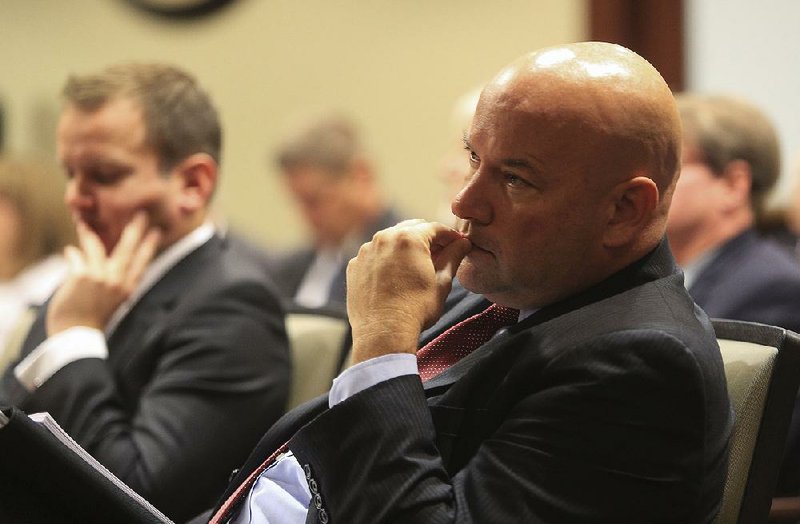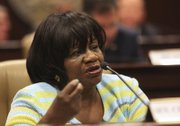Camelot Global Services will create and help implement a new business plan for the Arkansas Scholarship Lottery under a contract potentially worth more than $3.7 million.
The contract, which runs through June 30, 2020, cleared its final hurdle with the approval of the Arkansas Legislative Council.
Sen. Stephanie Flowers, D-Pine Bluff, was the lone lawmaker heard against the measure during a voice vote.
"I didn't like the Camelot marketing contract," she said after the meeting. "I think it's expensive. When we take away scholarships as we did in the last session from students and then we're pouring money into marketing companies for marketing the lottery -- I just don't think it's appropriate."
Before the vote, Richard Bateson, Camelot's senior vice president of sales and marketing, defended the contract, which calls for base compensation of up to $650,000 a year, plus up to $100,000 in expense reimbursements for meals, airfare, lodging, mileage, parking and more. If income soars, the company would also be eligible for bonuses.
And Larry Walther, director of the state Department of Finance and Administration, said Thursday that Camelot will have "probably 15 people in Arkansas working full time with the Arkansas Lottery hand in hand."
Bateson said Friday that the contract's bonus compensation was Camelot's real incentive to do business in the state.
"To be very clear here, though, because we're being vilified here... this base compensation is misleading," he said. "These are [costs] that we will have for providing resources on the ground here."
If the lottery's adjusted operating income -- essentially its profit before factoring in certain expenses -- increases, Camelot will be paid a portion of the additional money.
The company would receive 12.5 percent of that income between $72.28 million and $80 million; 13.75 percent of that income between $80 million and $90 million; and 15 percent of any adjusted operating income above $90 million.
If the lottery made $85 million, for example, Camelot would be paid $1.65 million on top of its other compensation.
The incentive structure is in effect through June 30, 2020. The contract includes options for two one-year extensions.
Lawmakers did ask for and receive a change to the pay structure during Friday's meeting.
Sen. Jimmy Hickey, R-Texarkana, a co-chairman of the lottery oversight committee who opposed the contract during a committee meeting on Thursday, said Camelot should not receive incentive payments if the state chooses not to follow Camelot's business plan.
"What is going to happen is they're going to deliver a business plan and we're going to pay them $500,000. At that particular point in time, we're going to come in and negotiate these consultancy services," he said.
Without the modification, Hickey said, the state might be forced to pay large sums even if the plan was never adopted.
"If the lottery or this committee decides they don't want to do that, we are automatically -- whenever we put ink on that contract -- we automatically at that point have to pay them $200,000 in cash, plus 12.5 percent of what the lottery grows according to their adjusted operating income number, for the next five years."
Bateson said his company would be willing to amend the contract so the state wouldn't be on the hook for incentive payments if it doesn't use Camelot's business plan.
The Arkansas Legislative Council approved the contract with the caveat that Camelot amend it. The amendment will head to the council's executive committee for final approval.
A date for that meeting has not been set.
The council, without discussion, also approved a Scientific Games International contract extension.
Scientific Games has had the lottery's contract for scratch-offs since the lottery began in 2009. The company will now provide scratch-offs to the state through Aug. 18, 2026.
Scientific Games cut the percentage of scratch-off sales that the lottery pays the vendor from 1.81 percent to 1.3 percent, but the company will be paid a bonus if scratch-off sales exceed $360 million in a contract year.
The bonus would be equal to 4.5 percent of sales exceeding $360 million during a given year.
If the lottery's scratch-off ticket sales remain flat for the term of the contract, the lottery could see savings that could be as much as $1.6 million to $1.8 million per year, lottery Director Bishop Woosley said earlier this week.
"Savings would continue to increase in proportion to sales until we hit the $360 [million] threshold, then it would begin to decline because of the bonus component of their comp structure. If sales were ever to reach $406,015,037 in any particular year, the savings would no longer be realized."
Woosley said that the savings that could be realized over the course of the contract will help to defer the costs of the Camelot contract, and the remainder will help bolster scholarship proceeds.
The lottery reported selling $390.1 million in scratch-off tickets in fiscal 2011 and $391.2 million in fiscal 2012 before these ticket sales dropped to $355 million in fiscal 2013 and $322.4 million in fiscal 2014.
Scratch-off ticket sales increased in fiscal 2015 to $335 million.
More than 80 percent of the lottery's ticket sales are scratch-off tickets, while the rest are ticket sales for draw games such as Powerball, Mega Millions, Cash 3 and Cash 4, Lucky for Life and the Natural State Jackpot.
The profit margin on draw game tickets is larger than for scratch-off tickets and that's why lottery officials want to boost their sales of draw game tickets.
Information for this article was contributed by Michael R. Wickline of the Arkansas Democrat-Gazette.
Metro on 10/17/2015

